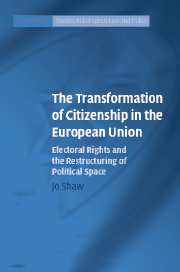 The Transformation of Citizenship in the European Union
The Transformation of Citizenship in the European Union Book contents
- Frontmatter
- Dedication
- Contents
- List of figures
- List of tables
- Preface and acknowledgments
- PART I Electoral rights in legal and political context
- 1 Introduction: electoral rights and the boundaries of the suffrage
- 2 Political membership in and beyond the state
- 3 Electoral rights for non-nationals: theoretical, legal and political accounts
- PART II The past, present and future of EU electoral rights
- PART III The contestation of electoral rights in the Member States of the European Union
- PART IV Conclusions
- Bibliography
- Index
3 - Electoral rights for non-nationals: theoretical, legal and political accounts
from PART I - Electoral rights in legal and political context
Published online by Cambridge University Press: 05 June 2015
- Frontmatter
- Dedication
- Contents
- List of figures
- List of tables
- Preface and acknowledgments
- PART I Electoral rights in legal and political context
- 1 Introduction: electoral rights and the boundaries of the suffrage
- 2 Political membership in and beyond the state
- 3 Electoral rights for non-nationals: theoretical, legal and political accounts
- PART II The past, present and future of EU electoral rights
- PART III The contestation of electoral rights in the Member States of the European Union
- PART IV Conclusions
- Bibliography
- Index
Summary
Introduction
This book is not a general normative or empirical enquiry into the topic of electoral rights for non-nationals, or the theme of alien suffrage. As I shall show in more detail at the end of this chapter, this book is not concerned with arguing the case for increasing, or restricting, the voting rights of non-nationals in the context of particular polities, including the European Union. On the contrary, it uses electoral rights for non-nationals, in the first place those granted (or denied) at the EU level and in the second place those granted (or denied) at the national level, as one possible framework within which to examine the multiple and varying meanings of citizenship in the contemporary European political space. It is particularly concerned with both the ‘nestedness’ and the contestedness of those rights, as these can provide powerful messages about what type of normative principles underpin any given polity (Jachtenfuchs, Diez and Jung, 1998).
Citizenship is, of course, only one possible paradigm which can be used to analyse evolving political spaces, institutions and relationships such as those which exist within the complex constitutional polity of the EU and its Member States. It would, perhaps, make just as much sense to use the ideal of democracy as the basis for a normative enquiry, or the networks of accountability which exist between institutional actors at different levels of government as the basis for an empirical enquiry. Instrumental reasons might suggest using citizenship just because the Article 19 EC electoral rights are treated in the EU as citizenship rights, but that hardly seems a convincing rationale on its own. However, as the previous chapter has hinted, despite the difficulties in grasping and applying a concept of citizenship, in particular beyond and sometimes even within the confines of the traditional nation state, citizenship retains a certain hegemonic character as a reference point for measuring matters of rights, access and belonging within systems of law and 52 governance.
- Type
- Chapter
- Information
- The Transformation of Citizenship in the European UnionElectoral Rights and the Restructuring of Political Space, pp. 52 - 90Publisher: Cambridge University PressPrint publication year: 2007


